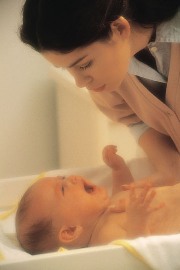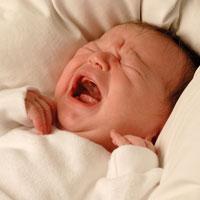|
What are Infant bowel problems?
STOMACH AND BOWEL DISORDERS AMONG INFANTS. Disorder of the stomach and bowels is one of the most fruitful sources of the diseases of infancy and infant bowel problems. Only prevent their derangement, and, all things being equal, the infant will be healthy and flourish, and need not the aid of physic or physicians. There are many causes of infant bowel problems which may give rise to these affections; many of them appertain to the mother's system, some to that of the infant. All are capable, to a great extent, of being prevented or remedied. It is, therefore, most important that a mother should not be ignorant or misinformed upon this subject. It is the prevention of these affections, however, that will be principally dwelt upon here; for let the mother ever bear in mind, and act upon the principle, that the prevention of infant bowel problems and disease belongs to her alone; the cure to the physician. For the sake of clearness and reference, these disorders will be spoken of as they occur: The infant at the breast.
The infant's stomach and bowels may become deranged from the breast-milk becoming unwholesome. This may arise from the parent getting out of health, a circumstance which will be so manifest to herself, and to those more immediately interested in her welfare, that it is only necessary just to allude to it here. Suffice it to say, that there are many causes of a general kind to which it may owe its origin; but that the most frequent is undue lactation, and the effects both upon mother and child fully dwelt upon. Anxiety of mind in the mother will cause her milk to be unhealthy in its character, and deficient in quantity, giving rise to flatulence, griping, and sometimes even convulsions in the infant. A fit of passion in the nurse will frequently be followed by a fit of bowel complaint in the child. These causes are of course temporary, and when removed the milk becomes as healthy and sufficient for the child as before. Sudden and great mental disturbance, however, will occasionally drive away the milk altogether, and in a few hours. A Mrs. S., at. 29, a fine healthy woman, of a blonde complexion, was confined of a boy. She had a good time, and a plentiful supply of milk for the child, which she continued to suckle till the following January, a period of three months, when her milk suddenly disappeared. This circumstance puzzled the medical attendant, for he could not trace it to any physical ailment; but the milk never returned, and a wet-nurse became necessary. In the following spring the husband of this lady failed, an adversity which had been impending since the date when the breast-milk disappeared, upon which day the deranged state of the husband's affairs was made known to the wife, a fact which at once explained the mysterious disappearance of the milk. Unwholesome articles of diet will affect the mother's milk, and derange the infant's bowels. Once, I was called to see an infant at the breast with diarrhoea. The remedial measures had but little effect so long as the infant was allowed the breast-milk; but this being discontinued, and arrow-root made with water only allowed, the complaint was quickly put a stop to. Believing that the mother's milk was impaired from some accidental cause which might now be passed, the infant was again allowed the breast. In less than four-and-twenty hours, however, the diarrhoea returned. The mother being a very healthy woman, it was suspected that some unwholesome article in her diet might be the cause. The regimen was accordingly carefully inquired into, when it appeared that porter from a neighbouring publican's had been substituted for their own for some little time past. This proved to be bad, throwing down, when left to stand a few hours, a considerable sediment; it was discontinued; good sound ale taken instead; the infant again put to the breast, upon the milk of which it flourished, and never had another attack. In the same way aperient medicine, taken by the mother, will act on the child's bowels, through the effect which it produces upon her milk. This, however, is not the case with all kinds of purgative medicine, nor does the same purgative produce a like effect upon all children. It is well, therefore, for a parent to notice what aperient acts thus through her system upon that of her child, and what does not, and when an aperient becomes necessary for herself, unless she desire that the infant's bowels be moved, to avoid the latter; if otherwise, she may take the former with good effect. Again; the return of the monthly periods whilst the mother is a nurse always affects the properties of the milk, more or less, deranging the stomach and bowels of the infant. It will thus frequently happen, that a few days before the mother is going to be unwell, the infant will become fretful and uneasy; its stomach will throw up the milk, and its motions will be frequent, watery, and greenish. And then, when the period is fully over, the milk will cease to purge. It is principally in the early months, however, that the infant seems to be affected by this circumstance; for it will be generally found that although the milk is certainly impaired by it, being less abundant and nutritious, still, after the third or fourth month it ceases to affect the infant. Is then a mother, because her monthly periods return after her delivery, to give up nursing? Certainly not, unless the infant's health is seriously affected by it; for she will generally find that, as the periods come round, by keeping the infant pretty much from the breast, during its continuance, and feeding him upon artificial food, she will prevent disorder of the child's health, and be able in the intervals to nurse her infant with advantage. It must be added, however, that a wet- nurse is to be resorted to rather than any risk incurred of injuring the child's health; and that, in every case, partial feeding will be necessary at a much earlier period than when a mother is not thus affected. The milk may also be rendered less nutritive, and diminished in quantity, by the mother again becoming pregnant. In this case, however, the parent's health will chiefly suffer, if she persevere in nursing; this, however, will again act prejudicially to the child. It will be wise, therefore, if pregnancy should occur, and the milk disagree with the infant, to resign the duties of a nurse, and to put the child upon a suitable artificial diet. The infant that is constantly at the breast will always be suffering, more or less, from flatulence, griping, looseness of the bowels, and vomiting. This is caused by a sufficient interval not being allowed between the meals for digestion. The milk, therefore, passes on from the stomach into the bowels undigested, and the effects just alluded to follow. Time must not only be given for the proper digestion of the milk, but the stomach itself must be allowed a season of repose. This evil, then, must be avoided most carefully by the mother strictly adhering to those rules for nursing. The bowels of the infant at the breast, as well as after it is weaned, are generally affected by teething. And it is fortunate that this is the case, for it prevents more serious affections. Indeed, the diarrhoea that occurs during dentition, except it be violent, must not be subdued; if, however, this is the case, attention must be paid to it. It will generally be found to be accompanied by a swollen gum; the freely lancing of which will sometimes alone put a stop to the looseness: further medical aid may, however, be necessary.
At the period of weaning. There is great susceptibility to derangements of the stomach and bowels of the child at the period when weaning ordinarily takes place, so that great care and judgment must be exercised in effecting this object. Usually, however, the bowels are deranged during this process from one of these causes; from weaning too early, from effecting it too suddenly and abruptly, or from over-feeding and the use of improper and unsuitable food. There is another cause which also may give rise to diarrhoea at this time, independently of weaning, viz. the irritation of difficult teething. The substitution of artificial food for the breast-milk of the mother, at a period when the digestive organs of the infant are too delicate for this change, is a frequent source of the affections now under consideration. The attempt to wean a delicate child, for instance, when only six months old, will inevitably be followed by infant bowel problems like disorder of the stomach and bowels. Unless, therefore, a mother is obliged to resort to this measure, from becoming pregnant, or any other unavoidable cause, if she consult the welfare of her child, she will not give up nursing at this early period. Depriving the child at once of the breast, and substituting artificial food, however proper under due regulations such food may be, will invariably cause bowel complaints. Certain rules and regulations must be adopted to effect weaning safely, the details of which are given elsewhere. If too large a quantity of food is given at each meal, or the meals are too frequently repeated, in both instances the stomach will become oppressed, wearied, and deranged; part of the food, perhaps, thrown up by vomiting, whilst the remainder, not having undergone the digestive process, will pass on into the bowels, irritate its delicate lining membrane, and produce flatulence, with griping, purging, and perhaps convulsions. Then, again, improper and unsuitable food will be followed by precisely the same effects; and unless a judicious alteration be quickly made, remedies will not only have no influence over the disease, but the cause being continued, the disease will become most seriously aggravated. It is, therefore, of the first importance to the well-doing of the child, that at this period, when the mother is about to substitute an artificial food for that of her own breast, she should first ascertain what kind of food suits the child best, and then the precise quantity which nature demands. Many cases might be cited, where children have never had a prescription written for them, simply because, these points having been attended to, their diet has been managed with judgment and care; whilst, on the other hand, others might be referred to, whose life has been hazarded, and all but lost, simply from injudicious dietetic management. Over-feeding, and improper articles of food, are more frequently productive, in their result, of anxious hours and distressing scenes to the parent, and of danger and loss of life to the child, than almost any other causes. The irritation caused by difficult teething may give rise to diarrhoea at the period when the infant is weaned, independently of the weaning itself. Such disorder of the bowels, if it manifestly occurs from this cause, is a favourable circumstance, and should not be interfered with, unless indeed the attack be severe and aggravated, when medical aid becomes necessary. Slight diarrhoea then, during weaning, when it is often traceable to the cutting of a tooth (the heated and inflamed state of the gum will at once point to this as the source of the derangement), is of no consequence, but it must not be mistaken for disorder arising from other causes. Lancing the gum will at once, then, remove the cause, and generally cure the bowel complaint.
Constipation in Children The bowel movement is also regular. A child having constipation not only finds it difficult to pass stool, but at times will feel the urge to pass and when he goes to the toilet, he cannot relive himself. It is the responsibility of the parents to make their children eat fiber enriched foods such as vegetables, fruits, and whole grains. Along with eating food rich with fiber, it is also a must to drink enough fluids. Water is the best fluid for this condition. Abdominal Pain in Children The pain shifts slowly to the right side of the lower abdomen within a time period of over twenty four hours. Clear symptoms are abdominal pain, vomiting, nausea, fever and loss of appetite. Diabetes can also be a reason of abdominal pain. Small children usually curl up, cry and express pain through facial expression. Some kids will be reluctant to talk, but the parent should try to get clear explanation of infant bowel problems. Along with close monitoring of the symptoms, studying the location of pain, pain duration, nature of vomiting, and urinary problems will help. After that a pediatric should be consulted who can further refer to a gastroenterologist. Until help is reached, the child should be made to relax. Often, lying with face in downward direction can relieve pain due to gas. Incase of vomiting and diarrhea, fluids should be given constantly. Solid food should only be given when the child is comfortable about eating it.
What is Abdomen Pain - causes, treatment and remedies For abdomen pain, always consult with your doctor first.
Bowel problems They can vary from a basic sluggishness, weakness or inability to digest and / or assimilate our food. They may include symptoms like bloating, flatulence, frequent burping, discomfort after eating, pain in the abdominal area. They may include difficulties or changes in your toilet habits and be due to intestinal parasites. Conditional like Ulcers and gastritis require more details to diagnose and need more serious attention and ultimately the problems may come from stomach or bowel cancer. This is a huge range of conditions that are all conditions of the digestive tract and mostly of the bowel. What we have here is to give an overview of the various conditions that may be causing your particular symptoms and you can click into the specific conditions to check them in more detail. Once you understand your condition then you can set about dealing with it. Some respond to diet change, some need medical intervention to bring under control, many will respond extremely well the non medical supplements like Aloe Vera Juice and taking acidophilus supplements. Check though here and we hope it will put you on the path to full heath again Bowel problems
 to “Your Health Success” our monthly F’R’E’E’ Newsletter
Back to Top of Infant bowel problems page
============================================================================ Back to Top of Infant bowel problems page
|






